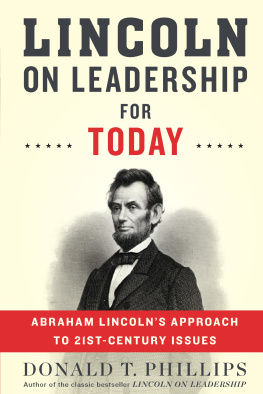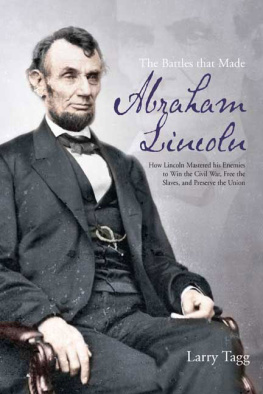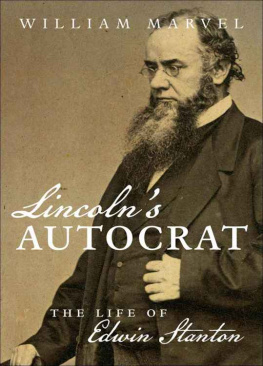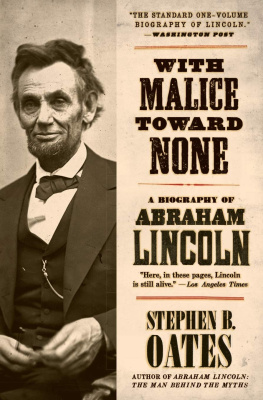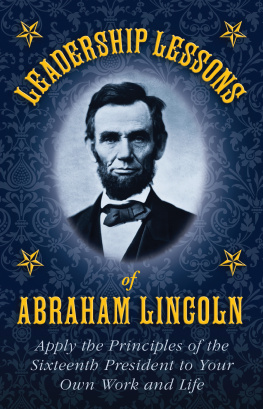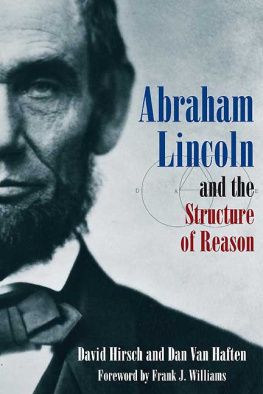Copyright 2017 by Donald T. Phillips
All rights reserved
For information about permission to reproduce selections from this book, write to or to Permissions, Houghton Mifflin Harcourt Publishing Company, 3 Park Avenue, 19th Floor, New York, New York 10016.
www.hmhco.com
Library of Congress Cataloging-in-Publication Data is available.
ISBN 978-0-544-81464-6
Cover design by Jackie Shepherd
Cover image Wynnter/Getty Images
e ISBN 978-0-544-81456-1
v1.0117
In memory
A.A.P.
Authors Note
T HIS BOOK is a journey. A journey through Abraham Lincolns life from a leadership perspective. Its also one big story. A story about how a poor young boy, predestined to be a leader, became one of the most respected people in world history. In the main narrative, I write about what Lincoln said and did in his own day with regard to, ironically, many of the same issues that still confront us.
Over the years, when Ive participated in speaking events or talked to the media, Ive invariably been asked what Lincoln would do about the problems we have in our world today, or what his stance might be on specific issues. Although Lincoln is long gone, his legacy, his reputation for consistently doing the right thing, and his wisdom continue to serve generations of Americans as something of a moral compass. And so, inspired by the many people who have asked me to do so, at the end of each chapter I offer a page or two of my personal thoughts on how Lincoln might specifically handle some key issues of our day. I know its a risky undertaking. And I certainly understand and respect that many people may disagree or, at the very least, be surprised by some of my conclusions. But these are honest and sincere opinions based on decades of study, and I accept full responsibility for what I have written. I also invite you to wrestle through what you think Lincoln might do in any given situation.
By studying Lincolns life, along with his words and actions in the context of history, I believe we can glean meaning from the remarkably moral and ethical life he led. And the lessons learned just might become a model for more effective leadership in our own time. Abraham Lincolns example represents the best of the America to which we may aspire. He showed us the kind of people we can be. Not an America that divides, but an America that pulls together. Not a shortsighted America, but an America that sees beyond and deeper. That is the Lincoln of this book. In the end, though, its up to each of us individually to determine what part of Lincoln we might use in our own daily lives to help make this world a better place in which to live.
Donald T. Phillips
He would sometimes mount a stump and begin giving a speech. Sure enough, all [work] would stop and [everybody] would gather around Abe to listen. Sometimes he gave political speeches to the boys.
Dennis Hanks (Lincolns cousin),
recalling Abraham Lincolns boyhood years
Prelude
B E GOOD to one another.
That was the last thing Nancy Hanks Lincoln said to her nine-year-old son, Abraham, and his older sister, Sarah. Spoken on her deathbed, they were not just words of hope and advice, they were words of faith.
By all accounts, Lincolns mother was a good Christian woman, very intelligent, and naturally strong-minded. She read the Bible to her children, taught them both to read and write by using the scripture. And Nancy seemingly took literally the statement from Ephesians, Be kind to one another. Thats how people should be guided in life, she believed. Let all bitterness, and wrath, and anger, and clamor, and evil speaking, be put away from you, with all malice.
When Abraham Lincoln was born in a one-room log cabin in the Kentucky backwoods on February 12, 1809, Thomas Jefferson was still president of the United States, Kentucky was officially part of Virginia (a slave state), and Illinois had just become a new territory. Although dirt-poor, Nancy Lincoln and her illiterate husband, Thomas, had a strong sense of morality. They were members of the Separate Baptist Church, a mostly anti-slavery denomination whose influence may have contributed to the family moving to a 300-acre farm in the new free state of Indiana. It was there that Nancy Hanks Lincoln died (in 1818), and by the next year, Thomas had married Sarah Bush Johnston, a widow with three children of her own. Now a member of a larger family, young Abe and his new stepmother quickly bonded. Some contemporaries believed she even favored him over her own children. He never told me a lie, she said of her stepson. He never evaded, never equivocated, never dodged, nor turned a corner to avoid any chastisement or other responsibility.
By all accounts, as a boy Lincoln was amiable, good-natured, unusually bright, and very gentle, especially with animals. Although he grew up in a community where hunting was a way of life, Abe didnt take to it. He had, of course, accompanied his father hunting, but when, at the age of eight, young Lincoln shot and killed a turkey himself, it upset him to the point that, as he said years later, [I have] never since pulled a trigger on any larger game. The boy was so tenderhearted toward animals of any kind that he once chastised a group of 10-year-old pals for putting hot coals on the backs of some turtles, and later lectured his stepsister on an ants right to life.
Young Lincoln was also an especially curious boy who loved to learna trait that was both recognized and encouraged by his stepmother. It was not uncommon for him to walk a mile or more to borrow and return books. He read while lying on the dirt floor of their cabin, his legs propped up against a wall. He read while doing chores, while walking, and while helping his father plow a field. He [had to] understand everything, even to the smallest thing, minutely and exactly, Sarah Lincoln remembered. He would then repeat it over to himself again and again, and when it was fixed in his mind, he never lost that fact or his understanding of it. Even Lincoln, himself, recalled that it bothered him not to understand something. It disturbed my temper, he said, to the point where he would spend no small part of the night walking up and down trying to sort something out or hunt down an idea.
As the years passed, young Lincolns knowledge accumulated exponentially, and it became obvious to Sarah that her stepson possessed an extraordinarily good memory. He would hear a sermon preached on Sunday, she said, and then come home, take the children outside, get on a stump or log and repeat it almost word for word. Lincolns cousin Dennis Hanks noted that Abe developed a skill for telling stories, which he would often do at gatherings such as house-raisings. He would sometimes mount a stump and begin giving a speech, Hanks recalled. Sure enough, all [work] would stop and [everybody] would gather around Abe to listen. Sometimes he gave political speeches to the boys, and sometimes he told jokes, which left them bursting their sides with laughter.
It wasnt long before the teenage Lincoln was regarded as the natural leader in his age group. He rarely quarreled or fought, and always was the peacemaker, his friends remembered. If there was any fighting about to commence, he would try to stop [it] by telling a joke or a story. And often, he was the one chosen to adjust difficulties between boys of his age and size, and usually his decision was an end of the trouble.
By his mid-teens, Abe Lincoln had shot up to over six feet in height (he would eventually reach six feet four inches). But with his height came long arms, a homely complexion, coarse black hair, and a gawky awkwardness, which made him self-conscious, especially around members of the opposite sex. He didnt go much with the girls, recalled Dennis Hanks, largely because he was shy and unsure of himself when around them.
Next page
